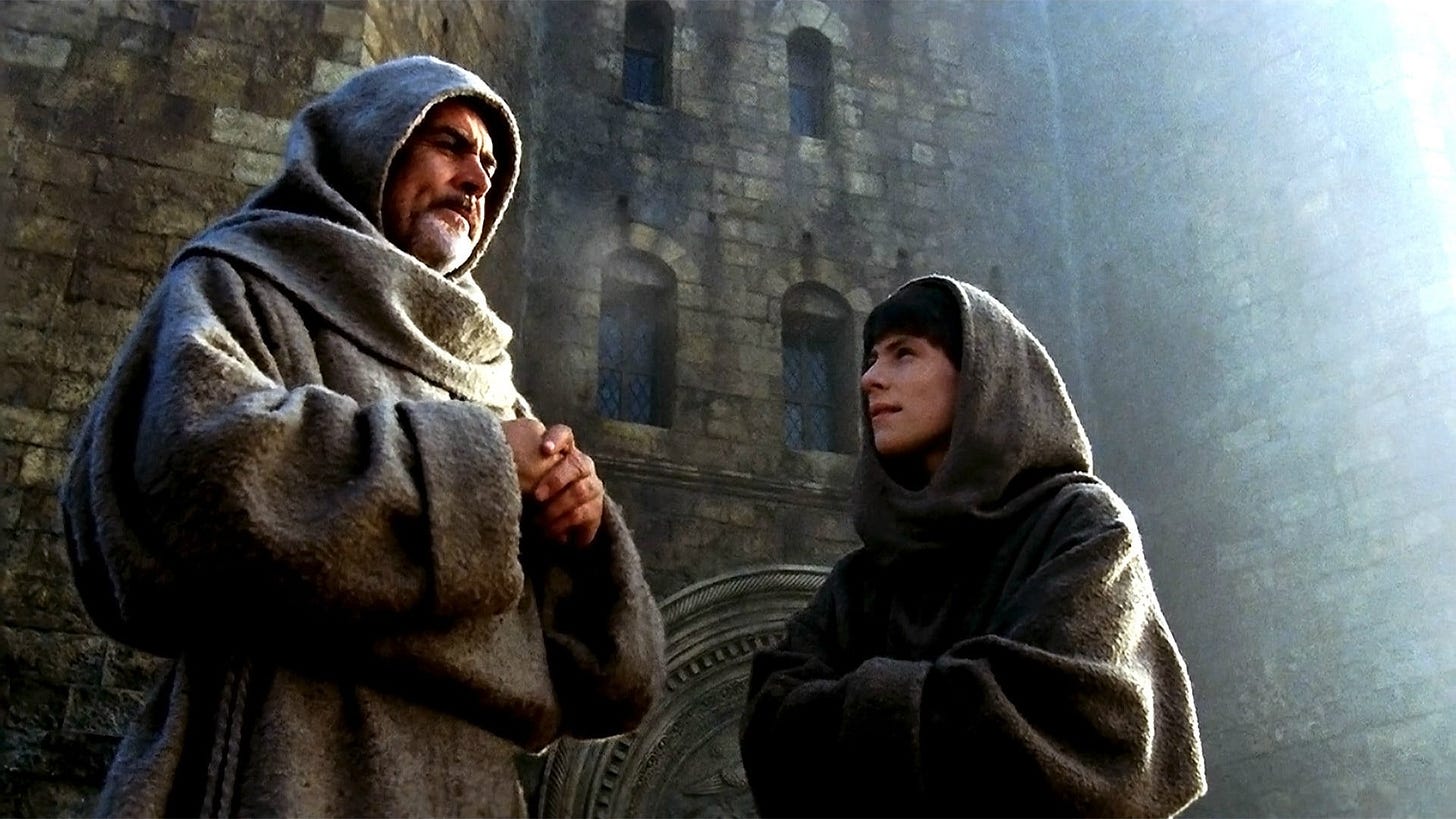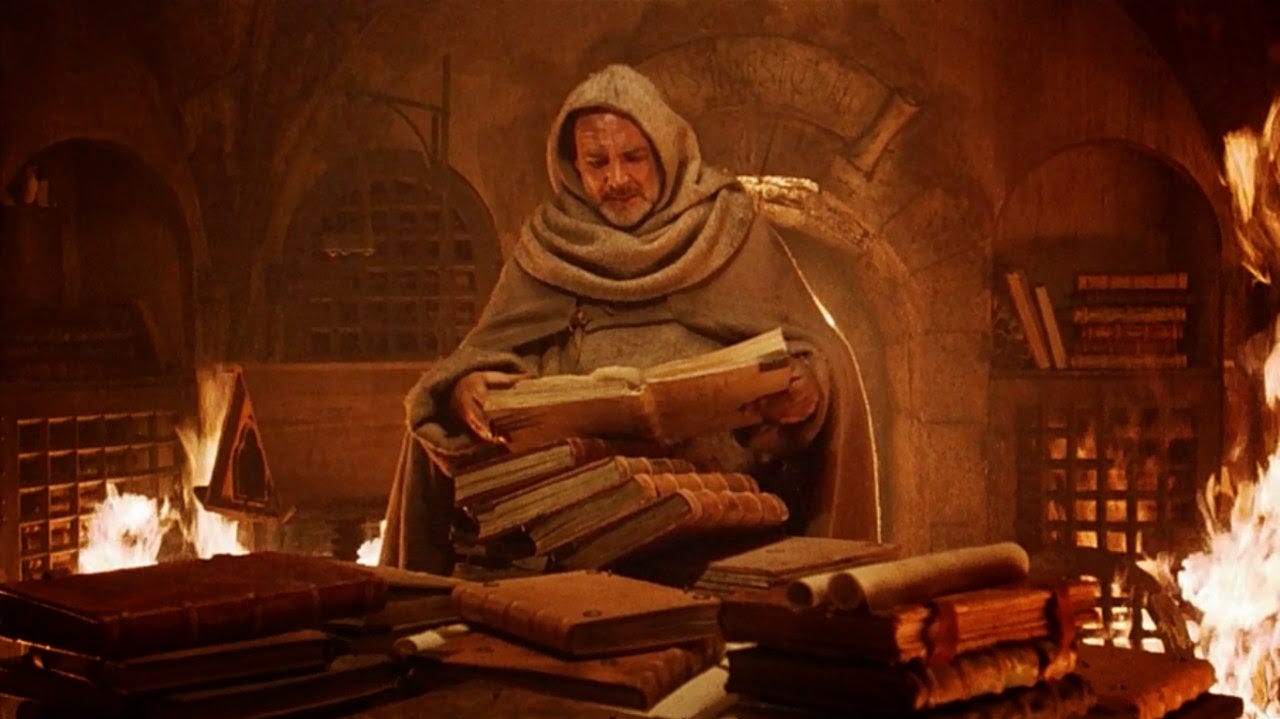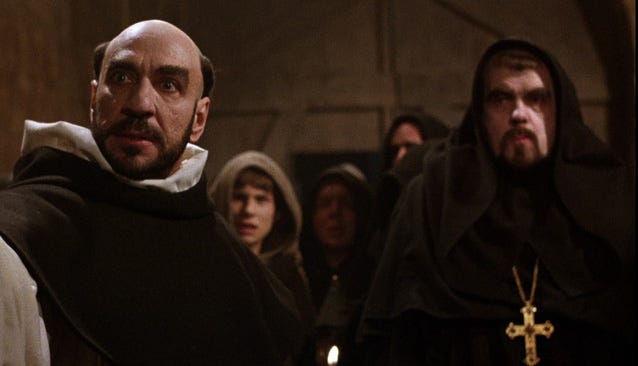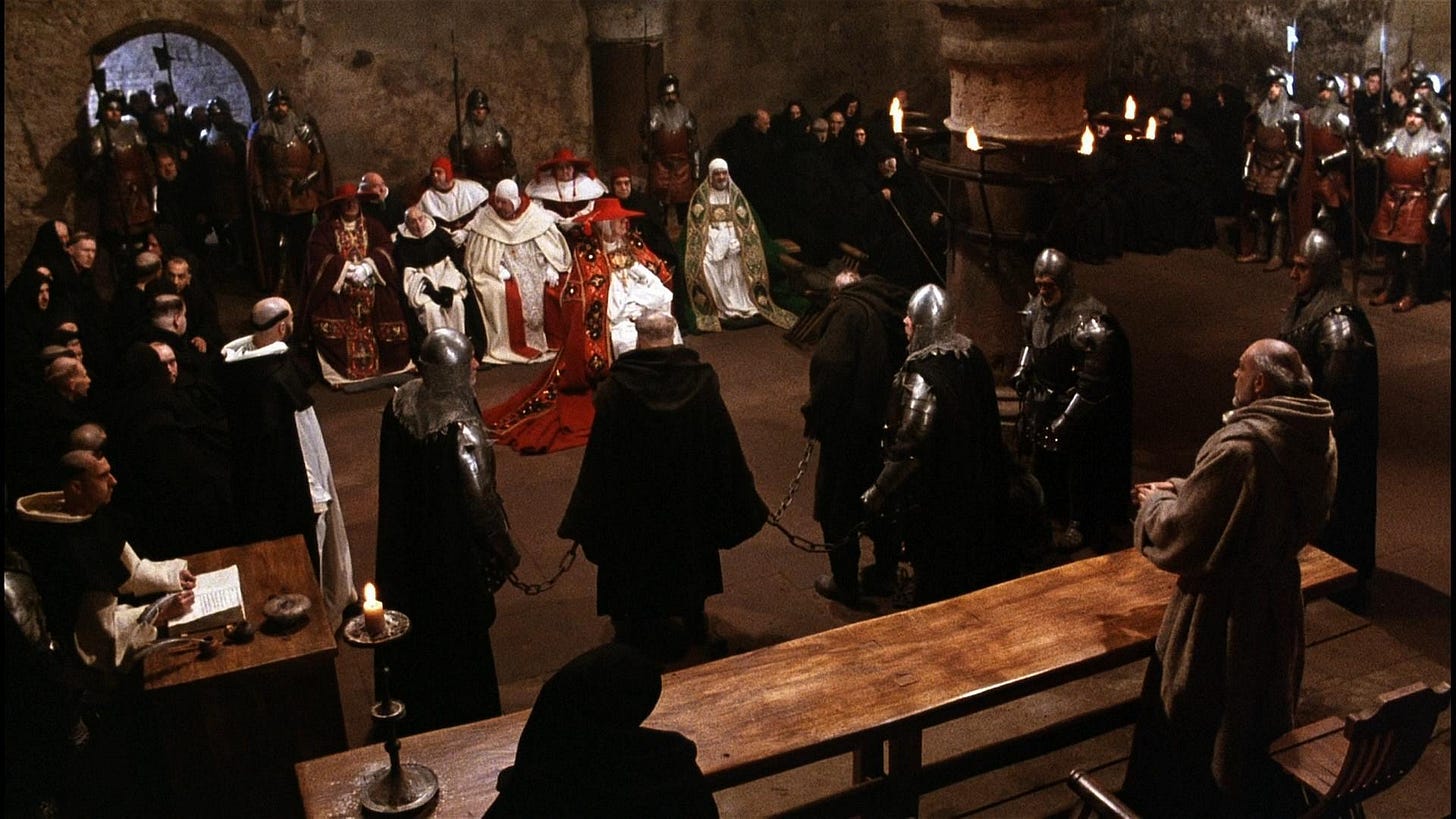The Name of the Rose (1986)
9/10
Is there a conflict between faith and reason? The Name of the Rose suggests so. Uncovering a trove of books by classical authors such as Aristotle in the tower of a remote Benedictine abbey in northern Italy, Franciscan friar William of Baskerville (Sean Connery) tells his young apprentice Adso (Christian Slater) that the church has forbidden anyone from reading these books “because they often contain a wisdom that is different from ours and ideas that could encourage us to doubt the infallability of the word of God... And doubt, Adso, is the enemy of faith.”
Other faith traditions offer different opinions. Anglicans, for example, since the days of Richard Hooker have identified three pillars of authority for theological knowledge: scripture, tradition, and reason. Theology as a discipline, however, arguably takes for granted the existence of God. Oxford Languages defines theology as “the study of the nature of God and religious belief.” When we step outside the realm of pure theology, the search for knowledge through science can produce conclusions that threaten religious dogma, as Galileo Galilei found out when the Roman Catholic Church persecuted him for asserting that the Earth revolves around the Sun.
Prompting discussions like this is one of the reasons I so greatly enjoyed The Name of the Rose, directed by Jean-Jacques Annaud and based on the novel by Umberto Eco. Set in 1327, the story follows William as he investigates a series of mysterious deaths at the abbey that the other monks believe to be the result of Satan’s presence. William, however, is an unorthodox medieval thinker. A firm believer in the power of reason, he searches for natural explanations behind these strange occurrences, leading him to discover a secret that might threaten the stability of the church and with it the whole feudal order.
Ably portrayed by Connery, William is a memorable character appealing because he embodies traits modern audiences have come to take for granted: a rationalist worldview, which anticipates the scientific method. In case it wasn’t obvious, there’s more than a hint of Sherlock Holmes to William’s reasoning based on physical evidence. That brings him into conflict with the clerical establishment, which sees such rational inquiry as a threat to its privileges and power.
While Christian monasteries preserved many ancient texts and manuscripts through the Middle Ages, advancing knowledge is another matter. Blind librarian Jorge de Burgos (Feodor Chaliapin Jr.), the abbey’s oldest inhabitant, explicitly speaks out against the very idea, telling the monks, “There is no progress in the history of knowledge, but a continuous and sublime recapitulation.” In this Jorge reflects the ideology of the feudal system, an essentially static way of life.
The rationalist worldview of William would later inform the bourgeoisie in its overthrow of feudalism, most famously in the Great French Revolution. “Religion, natural science, society, political institutions – everything was subjected to the most unsparing criticism: everything must justify its existence before the judgment-seat of reason or give up existence,” Friedrich Engels said of the mindset of the great French revolutionaries. “Reason became the sole measure of everything.” Objectively, however, their victory represented the establishment of capitalism in France. Today, the bourgeoisie has long since ceased to be a progressive force, falling back on religious obscurantism and other reactionary ideas to maintain its rule.
The Name of the Rose explicitly connects the church establishment’s fear of advancing knowledge with its desire to protect its own wealth and privileges against a backdrop of widespread poverty and ignorance. While the Franciscans take vows of poverty, papal representatives defend the vast riches of the Roman Catholic Church. To defend its power, the church is prepared to resort to torture and murder any perceived dissidents through the Inquisition, represented by the Dominican friar and inquisitor Bernardo Gui (F. Murray Abraham).
The inquisitors persecute Remigio de Varagine (Helmut Qualtinger), who previously belonged to the Dulcinians, which the Pope has declared to be a heretical sect. The Dulcinians supported an end to the feudal system and ecclesiastical hierarchy, returning the church to its original ideals of humility and poverty; and for the establishment of a new egalitarian society in which all property was held in common. In these views they echoed not just the early Christians, but prefigured radical groups such as the Levellers during the English Revolution. No wonder the wealthy rulers of the church saw such views as heretical. On trial, de Varagine says of his time at the abbey: “In the 12 years I have lived here, I have done nothing but stuff my belly, shag my wick, and squeeze the hungry peasants for tithes!”
Benoît Tanguay accurately says that The Name of the Rose “invites us to beware of those who reject reason and who seek to obscure reality with idealistic explanations. Reason and the search for an objective explanation for phenomena in the material world are dangerous for the rich and powerful, because they shed light on their crimes.” Such a message is important at any time, but especially during times like our own when capitalist society is falling into extreme crisis and reactionary demagogues stoke irrationality and obscurantism for their own ends.
Ideological content aside, this is a very well-made film. Annaud gives us many beautiful, painterly shots of the abbey and surrounding landscape. Lighting and use of shadow are impressive as Connery and Slater explore the depths of the tower, moving from darkness into light in a way that underscores the story’s themes. The sight of dirty, starving peasants in rags contrast with the higher-quality material of the friars’ robes, their jewel-encrusted crosses and ornate manuscripts. Yet even inside the abbey, we see plenty of dirt, squalor, unpleasant tasks like slaughtering pigs, and ugly, ignorant brutes like the hunchback Salvatore (Ron Perlman). It’s an antidote to the romanticization of the Middle Ages common among the far right.
Connery aside, the best performance comes from Abraham, who is appropriately cold and cruel as the chief inquisitor. A babyfaced Slater makes a good audience surrogate as William’s young sidekick. Salvatore is annoying, but to be fair that’s the character Perlman is tasked with playing. Probably the main aspect that could have been improved is the peasant girl (Valentina Vargas) Adso falls in love with. One could argue the two characters might not speak the same language; that peasants in general and women in particular were treated as subhuman in this time period. Still, it seems like a waste to not even give her a single line.
James Horner provides the icing on the cake with a typically excellent score. Ironically, Horner’s music for this story of medieval monks represented his first soundtrack based largely around electronic instruments, yet it feels appropriate in conveying this antiquated world rooted in religious obscurantism and mysticism. Unlike a lot of film music, the score works just as well listened to on its own, conjuring up a rich sense of atmosphere.







